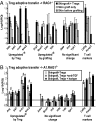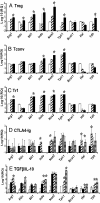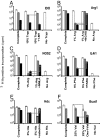Infectious tolerance via the consumption of essential amino acids and mTOR signaling
- PMID: 19567830
- PMCID: PMC2704109
- DOI: 10.1073/pnas.0903919106
Infectious tolerance via the consumption of essential amino acids and mTOR signaling
Abstract
Infectious tolerance describes the process of CD4(+) regulatory T cells (Tregs) converting naïve T cells to become additional Tregs. We show that antigen-specific Tregs induce, within skin grafts and dendritic cells, the expression of enzymes that consume at least 5 different essential amino acids (EAAs). T cells fail to proliferate in response to antigen when any 1, or more, of these EAAs are limiting, which is associated with a reduced mammalian target of rapamycin (mTOR) signaling. Inhibition of the mTOR pathway by limiting EAAs, or by specific inhibitors, induces the Treg-specific transcription factor forkhead box P3, which depends on both T cell receptor activation and synergy with TGF-beta.
Conflict of interest statement
Conflict of interest statement: S.P.C. and H.W. are shareholders in TolerRx Inc. and receive royalties for CAMPATH antibody sales. S.P.C. is a shareholder and adviser to BioAnaLab Ltd. A.L.M. has intellectual property interests in the therapeutic use of IDO and IDO inhibitors and receives consulting income from NewLink Genetics Inc.
Figures





References
-
- Hori S, Nomura T, Sakaguchi S. Control of regulatory T cell development by the transcription factor Foxp3. Science. 2003;299:1057–1061. - PubMed
-
- Wildin RS, et al. X-linked neonatal diabetes mellitus, enteropathy, and endocrinopathy syndrome is the human equivalent of mouse scurfy. Nat Genet. 2001;27:18–20. - PubMed
-
- Cobbold SP, et al. Immune privilege induced by regulatory T cells in transplantation tolerance. Immunol Rev. 2006;213:239–255. - PubMed
-
- Cobbold SP, et al. Induction of foxP3+ regulatory T cells in the periphery of T cell receptor transgenic mice tolerized to transplants. J Immunol. 2004;172:6003–6010. - PubMed
-
- Qin S, et al. “Infectious” transplantation tolerance. Science. 1993;259:974–977. - PubMed
Publication types
MeSH terms
Substances
Grants and funding
LinkOut - more resources
Full Text Sources
Other Literature Sources
Molecular Biology Databases
Research Materials
Miscellaneous

